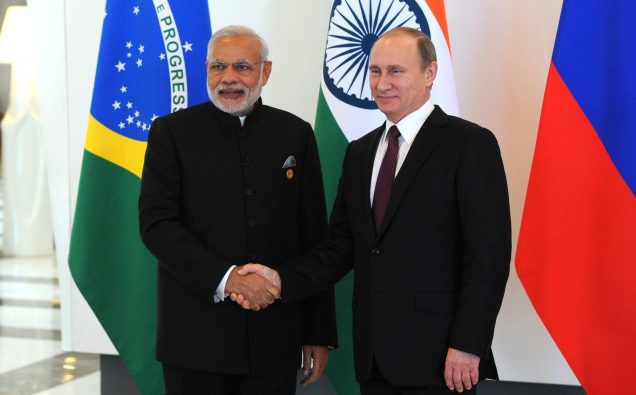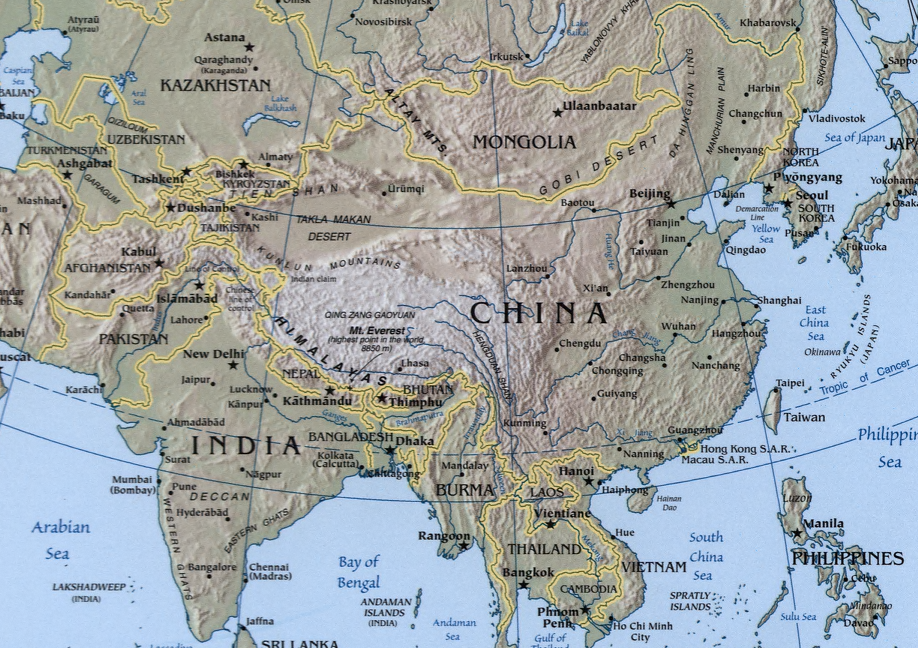
A 2015 photo shows Narendra Modi and Putin meeting at G-20 meeting, Credit: Kremlin.ru/Wikimedia Commons
As Prime Minister Narendra Modi pledged closer Russia ties Tueesday following last month’s meeting with Chinese Pdesident Xi Jinping, a senior Indian adviser has made it clear that New Delhi would pursue relations with regional powers independent of its ties with the United States.
A senior BJP leader visiting Washington D.C. explained that India advances its relations on the basis of a “de-hyphenated” foreign policy and that its relations with Moscow and Beijing will have no impact on New Delhi’s growing ties with the United States.
“Regional politics demand that we build strong bilateral relations with important powers in the region, some of them happen to be having difficulties with the U.S. But, that will not have any bearing on our relationship with the U.S.,” Ram Madhav, general secretary of the ruling Bharatiya Janata Party, said, according to a Press Trust of India report.
Madhav spoke in D.C. as Prime Minister Modi tightened his embrace of Russian President Vladimir Putin during talks in Black Sea resort of Sochi. Last month, Modi had also traveled to China to meet with Chinese President Xi Jinping, in an apparent move to smooth out relations in the wake of long-running border tensions between the two largest countries.
Meanwhile, U.S. relations with Russia and China have deteriorated in recent weeks due to lingering geostrategic tensions and U.S. plans to impose new trade tariffs.
Extremely productive discussions with President Putin. We reviewed the complete range of India-Russia relations as well as other global subjects. Friendship between India and Russia has stood the test of time. Our ties will continue to scale newer heights in the coming years. pic.twitter.com/EnNMarJkcB
— Narendra Modi (@narendramodi) May 21, 2018
Over the past decade, successive U.S. administrations have invested heavily in Washington’s relationship with India, which many analysts see as a counterweight to rapidly rising China. As India got close to the United States, its relations with China and Russia faced a stalemate, despite continued close defense cooperation with Moscow and economic cooperation with Beijing.
But in a space of few weeks, Modi has indicated working out a rapprochement with China and on Tuesday called Putin his personal friend.
“Russia is India’s old-time friend. We share long-standing historical ties, and Mr. President is my personal friend and a friend of India,” Modi said at the meeting.
“For the past four years, you and I stood side by side in the bilateral format and on the international stage… I am very glad that it was so,” Modi told Putin in Sochi.
Some analysts say President Donald Trump’s re-imposition of sanctions against Iran following Washington’s pullout of the Iran nuclear deal has set back India’s plans to get closer to Tehran and build a new Chabahar sea port to offset Chinese growing influence that comes with Gwadar deep sea port on the edge of Pakistani southwestern province of Balochistan opening into the oil-rich Gulf.
“The main driver of this meeting is the geopolitical environment prevailing today,” PS Raghavan, chief of India’s national security advisory board, told Al Jazeera, according to a report on the channel’s website.
“The primary purpose of Modi’s Russia trip would be to discuss the evolving geopolitical situation and to understand each other’s perspective – to be able to see how we can both deal with situations in common interest,” added Raghavan, who previously served as Indian envoy to Russia.
In D.C., Madhav, a prominent leader of the nationalist right wing party, explained New Delhi’s foreign policy rationale.
Farewell, my friend! In a special gesture symbolizing our friendship, Russian President #Putin personally bid farewell to PM @narendramodi at the airport at the conclusion of PM's short but successful visit to Russia. pic.twitter.com/uK8mqGfiip
— Raveesh Kumar (@MEAIndia) May 21, 2018
“Look in the last three-four years, you must have noticed we have followed what we call as de-hyphenated foreign policy.
“A de-hyphenated foreign policy means that India would pursue its relationship with different countries independent of their relationship with any third country.”
“India is pursuing the de-hyphenated policy. We have certain regional imperatives that command us to establish relationship with powers of different poles in the region. But that does not affect the larger issues like US India bilateral relationship,” Madhav said, according to a PTI report, while answering questions about implications of New Delhi’s regional and U.S. ties.


















